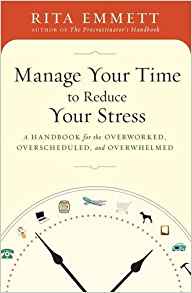 Title: Manage Your Time to Reduce Your Stress: A Handbook for the Overworked, Overscheduled, and Overwhelmed
Title: Manage Your Time to Reduce Your Stress: A Handbook for the Overworked, Overscheduled, and Overwhelmed
Author: Rita Emmett
Genre: Nonfiction, Self-Help
Publisher: Walker Books
Publication Date: December 2008
Pages: 208
Format Read: audiobook
Standalone or series: standalone
Where I got the book: Library Libby app
Date finished reading: February 28, 2019
Goodreads Description: A self-improvement guru’s inspiring and effective tips for gaining control of our Herculean workloads and overbooked personal lives.
How often do you think to yourself, So much to do and so little time? I n the sympathetic and insightful style of The Procrastinator’s Handbook, Rita Emmett offers help for those of us with too much to do. T he key is not time management but “stuff” management—taking control of all those tasks to do, people to see, commitments and obligations to fulfill. Mismanagement of all that “to-do” stuff is what leads to stress.
We often have little control over the demands made upon us, yet we can control our response. T hat’s where the management of stress must start. Emmett combines quick, easy-to-digest tips and infectious good humor to give readers positive ways to handle stress and their overly busy lives, first by understanding how stress impacts our physical, mental, and emotional health. She shows us how to cut down on distractions and interruptions that sap our concentration and energy, be more organized and streamline our duties, ask for help and be more selective about what we choose to do, and clarify our values and prioritize activities based on what is important. Spending time doing things that are incongruent with your values, striving for perfection, being overly competitive, and job insecurity are some of the reasons people feel overburdened and overwhelmed. Emmett draws on the stories of many people who have participated in her seminars, and readers will not only identify with their problems but can find common ground in the strategies that have worked for them.
My Review: I often gravitate to self-help books that deal with clutter and time management, as those are two big issues that exist in my daily life that keep me from being happy. I live in a society, where work dominates people’s lives. To afford a place to live, healthy foods and modern conveniences, one must make enough money to pay for those things. Our work days are long and our vacation days are minimal. My husband and I also get to add a semi-lengthy commute time to and from work as part of our daily routine. By the time we get home from work, the last thing we want to do is housework, and yet it has to get done. Once those projects are completed, then it is time to go to sleep and start the whole process again the next day. It is not quite the enjoyable life I had envisioned for myself. Don’t get me wrong, both my husband and myself love our jobs, but I still believe that jobs should not dominate your life even if you do enjoy them for the most part. I believe that making connections with people and family, maintaining hobbies and learning new skills should also be part of one’s life. Rita Emmett tries to reprogram our daily lives to incorporate things that our valuable to us – not just work – in her book Manage Your Time to Reduce Your Stress: A Handbook for the Overworked, Overscheduled, and Overwhelmed.
“This book will tackle time management not in terms of being more productive or efficient, but in terms of how we spend our time in relation to all that is important and valuable in our lives.”
Are you overworked, overscheduled, and overwhelmed? This is a great book to get you started on overcoming those issues and living a better life. Here are some great ideas listed throughout this book to help get you started on this path:
- Learn to say “no.” – “The secret of stress management is grasping the concept that we have zero control over the stressers or demands made upon us, yet we have 100% control over our response.” It is okay to decline an invitation, etc if your schedule does not permit and there are other things that need to get done.
- Discover what are the thing that you value most in your life. – These are the things that bring you the most joy, like spending time with family and friends, walking your dog, knitting or baking, etc. Once you have your list, then you can see what things you should start making time for in your life. “I observed that people put off things they hate to do. Now they still put off what they hate to do, but to me the biggest change in that area is that now they also put off what they love to do.”
- Outsource. – Don’t be afraid to ask for help. A lot of people see the word “outsource” and think that it means paying someone to do something for them, and some people may not have the financial privilege to do this. However, outsourcing can just be as simple as asking a friend or family member for help. When I started my new job last year, I had far less time at home to get housework done. I am fortunate that while I dislike cooking, my husband enjoys cooking, so that is one area I asked him to help with regarding household chores. He cooks and cleans up after dinner, while I do other household cleaning, laundry, etc. that needs to get done. When we had a water leak in our house that caused us to have to do some immediate household repairs done, we called a family member to come and be at our house when we couldn’t get away from work and the repairmen were there. The last story I have about outsourcing is that my husband and I have a house with a pool. A pool is wonderful but a lot of work. I could never justify paying someone to come and clean my pool, while I was working part-time and making very little money. However, I work more and make a little more money now, so I have hired someone to take care of the pool, which saves me a lot of time. A surprising thing I learned from this is that I was actually spending more money on supplies for pool maintenance than what it costs me to have someone else take care of it. Plus, my time is worth something as well.
- Don’t expect perfection but excellence is achievable. I know a lot of perfectionists in my life, and at times I am one too. However, when time is limited, sometimes you just have to do the bare minimum to accomplish a task. It might also come in handy to be a multi-tasker.
- Declutter. Your environment is important to managing your stress. As someone who suffers with some clutter issues, I fully agree with this statement. At times I haven’t had a place to sit and relax after work, because there was stuff on every chair and couch. I’ve also misplaced bills and most recently my jury duty summons. Taking time to reduce your clutter can leave you with a more relaxing environment to destress.
- Set boundaries and shutoff distractions. How many times have you been out to eat with people (family, friends, coworkers, etc.) and they spend the entire meal on their phone or at least observed that happening at other tables around you? Modern technology is great, but it has its downsides as well. Often it distracts you for and takes up your valuable time. I’ve heard of people who are disabling social media sites from their phones or computers so that they can focus on work. I, myself, often put my phone on silent when I am out with family and friends, because the time I am sharing with them is too important to be interrupted.
- Take time to recharge. It is easy in today’s world to constantly feel overwhelmed and tired. It is important to have habits that can help energize you. Eating healthier (more fruits & veggies less caffeine and sugar), exercising frequently and getting more sleep are ways to energize your body. Also, find some time in your daily routine to do things you love that will relax you or make you happy, like read a book or take a hot bath. The author asks us what we would do if we had one day or even one week where we could do whatever we wanted with no other obligations. That is a very intriguing concept and thought-provoking. How would you spend that time?
I enjoyed how the author listed these key points and then gave a description of the point with some ideas of how to tackle these in your life. Some of these points really hit home for me and I think these tips will be very helpful to others as well. However, I did not like all the quotes. I did not think that those added to the learning experience in this book, and I personally am still looking at ways to be more efficient with the time I do have. Unfortunately, I have to work, as I have bills and debt to pay off. I love my job and don’t want to stop working this job, but it does consume much of my days, so I would like more insight on how I can get everything else done that needs to get done when I am not working and still have time for the things I value and love.
My Rating: ♦ ♦ ♦ ♦
